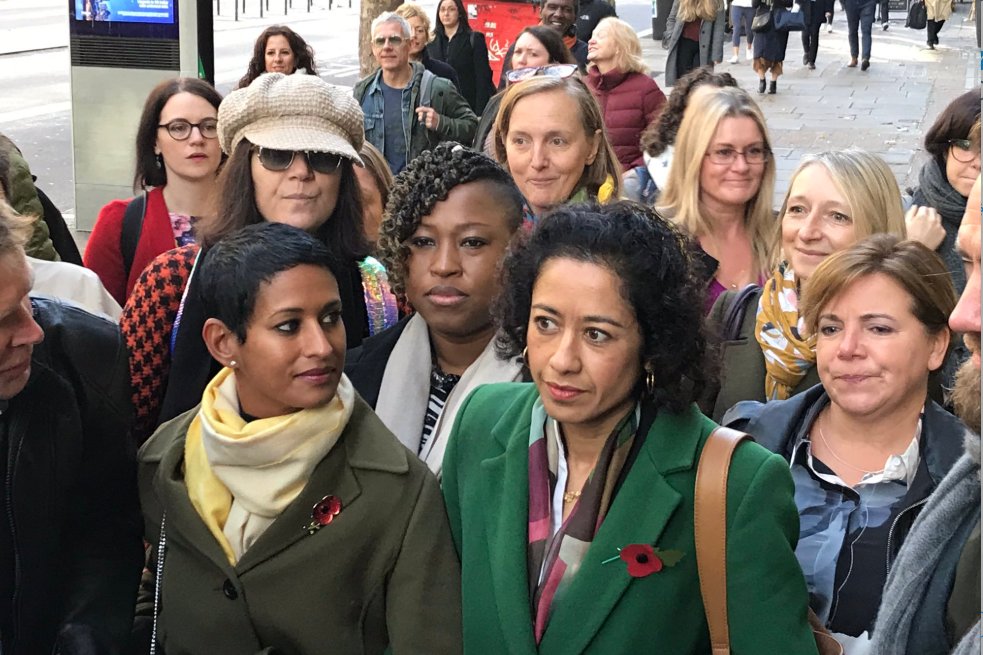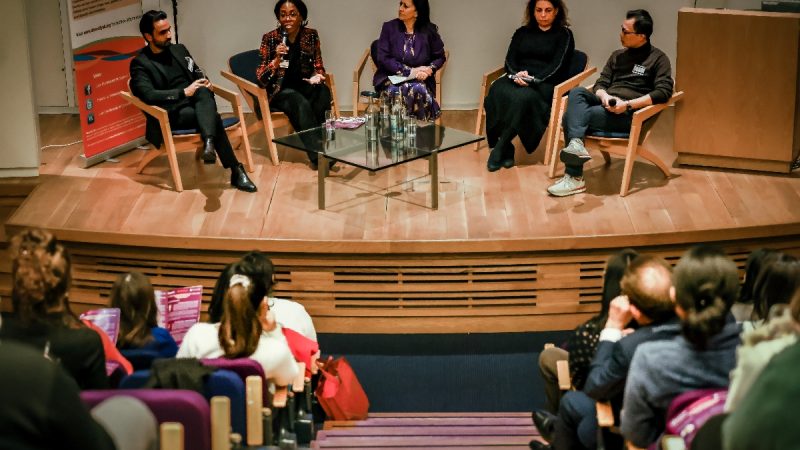Samira Ahmed challenges BBC pay gap

BBC presenter Samira Ahmed appeared at an employment tribunal on Monday 28 October 2019 to challenge unequal pay at the BBC, in a case backed by the National Union of Journalists (NUJ).
The case will be heard at Central London Employment Tribunal over 7 days and will focus on Samira’s contracts on the BBC programme Newswatch, which she has presented since 2012. Her equal pay comparator is Jeremy Vine in relation to his work on Points of View between 2008 and July 2018. He was paid £3,000 per episode of Points of View between 2008 and 2018. His fee was then reduced to £1,300 in January 2018. He left the programme in July 2018. By way of contrast, Samira Ahmed was paid £440 per programme from 2012. Although this was increased in 2015 to £465 per programme, it was then reduced again when the BBC moved presenters onto employment contracts.
The BBC 1 audience for Newswatch is 1.5-1.9 million.
Points of View has 800,000.
There are also another 100,000 Newswatch viewers on the Newschannel.
Both programmes were presenter-led programmes just under 15 minutes long, which considered audience feedback on BBC programmes and offered the public the opportunity to air their opinions on BBC content. Yet the BBC’s legal team will argue that Samira Ahmed and Jeremy Vine were not doing the same or similar work when presenting the two programmes.
Samira’s other work at the BBC includes presenting Front Row on Radio 4 and the News Channel. She has just concluded work on a 3-part documentary series for BBC 4 on The Persians, the first major TV series of its kind shot in Iran for 40 years.
Samira previously secured an agreement from the BBC to full backdated pay with male comparators for her work on Front Row on Radio 4 and Night Waves/ Free Thinking on Radio 3. On Front Row her male comparator was being paid 50 per cent more than her. On Night Waves her male comparator was being paid 33 per cent more.
Samira Ahmed said, "I love my job on Newswatch despite it being difficult and challenging. I know that it is an important part of demonstrating the BBC service to all its audiences and the licence fee payers. I have a sense of pride working for a public service broadcaster which seeks to represent the diversity of Britain and its licence fee payers. I have a sense of pride working for a public service broadcaster that seeks to represent the diversity of Britain and its licence fee payers. On the back of my BBC ID card are written the BBC values which include ‘we respect each other and celebrate our diversity’ and ‘we take pride in delivering quality and value for money’. I just ask why the BBC thinks I am worth only a sixth of the value of the work of a man for doing a very similar job."
Michelle Stanistreet, NUJ general secretary, said, "The scourge of unequal pay has no place in our public service broadcaster and that’s why the NUJ is backing Samira’s case and many others. Unfortunately, despite Samira going through a lengthy and frustrating internal process in the hope that a sensible solution could be achieved, the BBC has not resolved this case and it will now be for the tribunal to determine whether this monumental pay gap is appropriate and defensible. Samira is to be congratulated for her persistence and determination to secure fair and equal treatment by her employer."
Representing Samira in her case is Caroline Underhill, equal pay practice lead at Thompsons Solicitors and Claire Darwin, a barrister specialising in employment and discrimination law at Matrix Chambers.
Samira is supported by her many friends and colleagues throughout the BBC. Other colleagues across the wider broadcasting and media industry have offered Samira their support and solidarity in her stand for equal pay, including Sandi Toksvig, Alan Rusbridger, Andrew Copson, Baroness Sayeeda Warsi and the Right Reverend Nicholas Baines.
Baroness Sayeeda Warsi said:
"I was shocked and surprised to find out Samira was paid so much less for Newswatch than Points of View. She is a hugely significant representation of modern Britain, with decades of experience and I think many people see her as a real star. On Sunday Morning Live on BBC1 I really appreciated the way she corralled her panellists on often heated ethical debates, challenging Muslim campaigners as well as Tommy Robinson about his attitude to Islam."
Alan Rusbridger, former editor of the Guardian, hailed her journalistic flair:
"I regard her as one of the BBC’s stars. I’m proud that her talent was first spotted by The Guardian. I first became aware of her when she worked as a presenter and reporter at Channel 4 News from 2000-2011. She was very much a high profile face of the show. I’m surprised her profile has not always been better recognised by her own employer, the BBC. On television and radio Samira’s presence is authoritative, firm but fair and with a good sense of humour. Whether on the News Quiz, interviewing stars on Front Row or grilling BBC editors on Newswatch."
Sandi Toksvig, broadcaster and founder of the Women’s Equality Party, paid tribute to Samira’s contribution on The News Quiz:
"In 2012 I was the host of Radio 4’s The News Quiz. We were looking to expand our team of guests and wanted savvy people with wit, erudition and a good knowledge of the news. Samira was the perfect fit. She always got a great cheer from the audience when I announced her and anecdotally I can tell you that she was much loved by the regular fans. She was sharp, to the point and never less than a delight to work with."
The case opens on Monday 28 October with witnesses expected to be appearing from Tuesday 29 October.
Monday 28 October, UPDATE: On the first day of the tribunal, the BBC had been resisting disclosure of documents, which the judge has now ordered the BBC to provide. There has therefore been a delay and the claimant’s evidence is now due to begin on Wednesday morning at 10.00.




